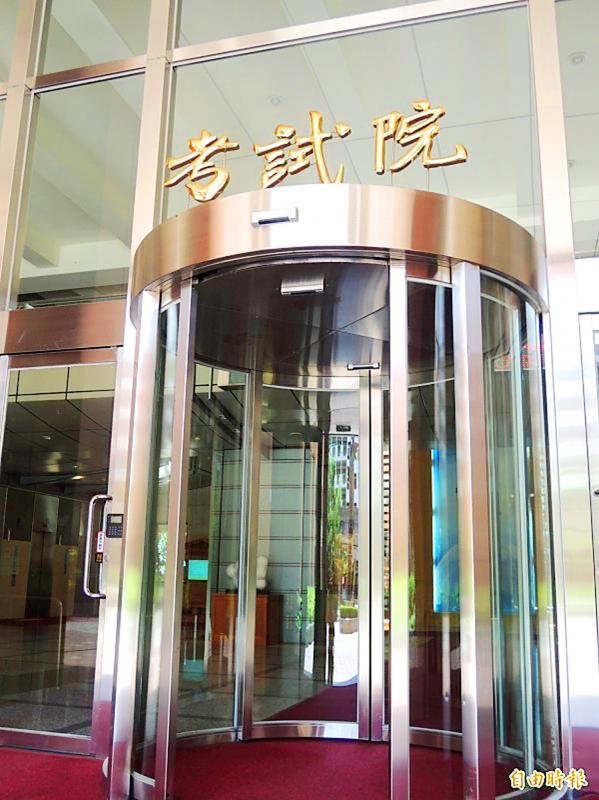Amid calls for its abolition, the Examination Yuan yesterday issued a statement urging people to respect its constitutionally ordained right to independently oversee the national examinations of civil servants — but the move drew flak from several incumbent and newly appointed members.
The Examination Yuan is now headed by Wu Chin-lin (伍錦霖) of the Chinese Nationalist Party (KMT), while Huang Jong-tsun (黃榮村), the newly appointed Examination Yuan president and a former minister of education, is to assume office, along with other newly appointed members, on Sept. 1 for the next four years.
Many lawmakers across party lines have renewed their calls to abolish the Examination Yuan and the Control Yuan — two of the five branches of government — when the Presidential Office nominated new members for the two bodies.

Photo: Yang Mien-chieh, Taipei Times
During the Legislative Yuan’s review last month of nominees for the Examination Yuan, Huang said that he was prepared to be its last president.
Abolishing the Examination Yuan, or attempting to undermine the independence of the power of examination, will result in officials being appointed not because of ability, but because of personal preferences, trampling on the rights of the disadvantaged, setting back government efficiency and damaging administrative neutrality, the Examination Yuan said in a statement.
Since the first examination was conducted in 1950, national exams have been held as the standard for the recruitment of civil servants, evidence that the public agrees with Article 85 of the Constitution, which states: “The selection of civil servants should be based on the results of open competition via an examination system,” it said.
The policy of selecting talent via public examinations guarantees the rights of the disadvantaged and allows ease of transition for people from different social strata, it said.
The Examination Yuan’s efforts to ensure fair competition for civil servant positions have resulted in the abolition of laws and regulations that would otherwise allow people to become civil servants without passing the examinations, it said.
Allowing government agencies to simultaneously hire contract-based employees and those who passed national examinations would not only push personnel costs beyond the currently projected 8 percent, but also severely dampen morale for those who took and passed the national exams, it said.
Should the Examination Yuan be abolished and the Executive Yuan insist that it has control over all executive matters — including the right to appoint officials — it would undermine guarantees of non-partisanship for civil servants as stipulated in Article 18 of the Constitution and sow the seeds of doubt among the public regarding government neutrality, the statement read.
However, a statement issued later yesterday by incoming Examination Yuan vice president Chou Hung-hsien (周弘憲), two incumbent members — Yang Ya-hui (楊雅惠) and Chen Tzu-yang (陳慈陽) — and other officials said that the Examination Yuan should respect the Legislative Yuan and public opinion.
Examination Yuan members should state their own opinions as individuals, instead of issing a collective statement under the agency’s name, they said.
As to whether the government should be composed of three or five branches, the Legislative Yuan has the right to propose constitutional amendments, they added.
The argument for the independence of the power of examination is weak, as Taiwan is the only democratic nation in the world that has a five-branch system of government, they said.
Additional reporting by CNA

Taiwan would welcome the return of Honduras as a diplomatic ally if its next president decides to make such a move, Minister of Foreign Affairs Lin Chia-lung (林佳龍) said yesterday. “Of course, we would welcome Honduras if they want to restore diplomatic ties with Taiwan after their elections,” Lin said at a meeting of the legislature’s Foreign Affairs and National Defense Committee, when asked to comment on statements made by two of the three Honduran presidential candidates during the presidential campaign in the Central American country. Taiwan is paying close attention to the region as a whole in the wake of a

Chinese Nationalist Party (KMT) Chairman Eric Chu (朱立倫), spokeswoman Yang Chih-yu (楊智伃) and Legislator Hsieh Lung-chieh (謝龍介) would be summoned by police for questioning for leading an illegal assembly on Thursday evening last week, Minister of the Interior Liu Shyh-fang (劉世芳) said today. The three KMT officials led an assembly outside the Taipei City Prosecutors’ Office, a restricted area where public assembly is not allowed, protesting the questioning of several KMT staff and searches of KMT headquarters and offices in a recall petition forgery case. Chu, Yang and Hsieh are all suspected of contravening the Assembly and Parade Act (集會遊行法) by holding

PRAISE: Japanese visitor Takashi Kubota said the Taiwanese temple architecture images showcased in the AI Art Gallery were the most impressive displays he saw Taiwan does not have an official pavilion at the World Expo in Osaka, Japan, because of its diplomatic predicament, but the government-backed Tech World pavilion is drawing interest with its unique recreations of works by Taiwanese artists. The pavilion features an artificial intelligence (AI)-based art gallery showcasing works of famous Taiwanese artists from the Japanese colonial period using innovative technologies. Among its main simulated displays are Eastern gouache paintings by Chen Chin (陳進), Lin Yu-shan (林玉山) and Kuo Hsueh-hu (郭雪湖), who were the three young Taiwanese painters selected for the East Asian Painting exhibition in 1927. Gouache is a water-based

President William Lai (賴清德) has appointed former vice president Chen Chien-jen (陳建仁) to attend the late Pope Francis’ funeral at the Vatican City on Saturday on his behalf, the Ministry of Foreign Affairs said today. The Holy See announced Francis’ funeral would take place on Saturday at 10am in St Peter’s Square. The ministry expressed condolences over Francis’ passing and said that Chen would represent Taiwan at the funeral and offer condolences in person. Taiwan and the Vatican have a long-standing and close diplomatic relationship, the ministry said. Both sides agreed to have Chen represent Taiwan at the funeral, given his Catholic identity and